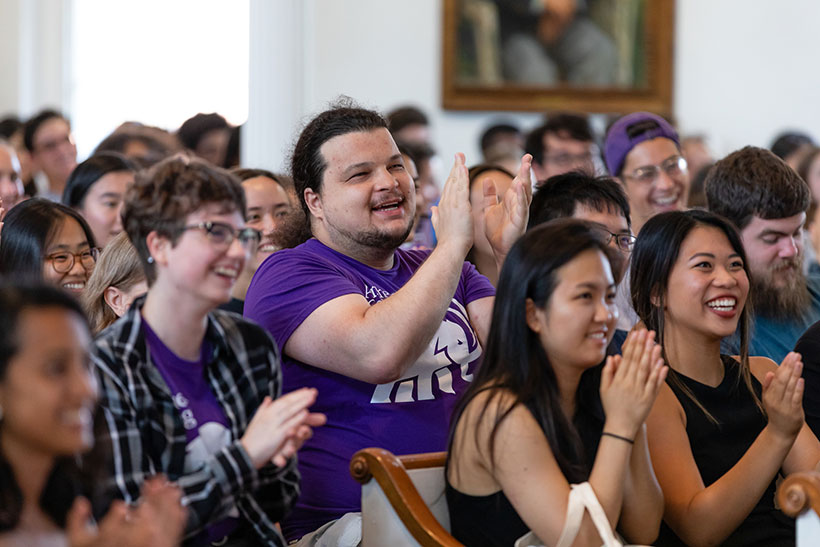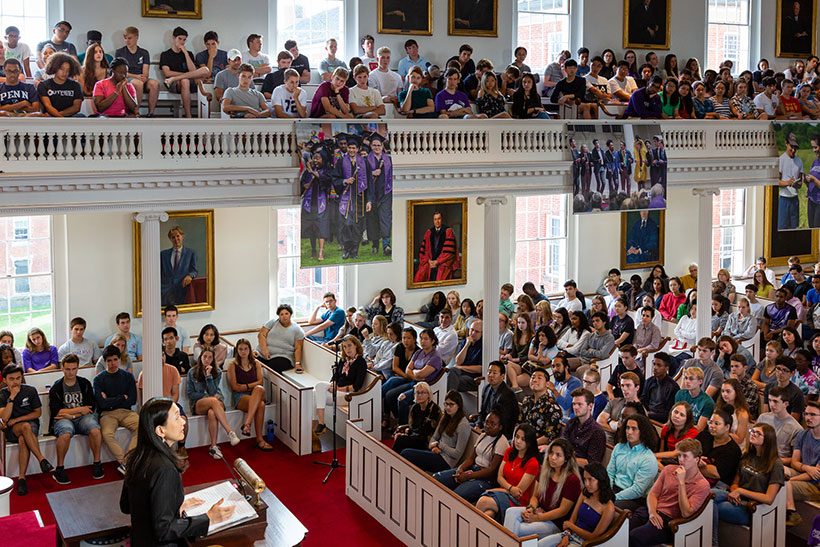“You and I are the new kids here,” Min Jin Lee told the audience in Johnson Chapel on Sept. 1. She hoped that, when they saw her in Valentine Dining Hall in the coming weeks, they would invite her to join them at their table.
She was delivering the annual DeMott Lecture, reminding the class of 2023 that she too was going through her first week at Amherst. Lee is the College’s writer-in-residence for 2019–22, scheduled to teach introductory workshops in fiction and nonfiction writing. The incoming class had been assigned to read her novel Pachinko, a finalist for the 2017 National Book Award. She expressed half-joking sympathy that “a 500-page novel was foisted upon you” during summer vacation, and explained that she has been interviewing their fellow young adults in multiple countries as part of her research for her upcoming third novel—which, like Pachinko and the 2007 bestseller Free Food for Millionaires, will examine aspects of life in the Korean diaspora.
The award-winning author added that she could empathize with the new students’ possible feelings of insecurity or “impostor syndrome,” as she has never earned any academic degrees in the area in which she will be teaching. (Later, during the audience Q&A, she told a student, “I really hope that while I’m here, you will be my teacher.”)

Then Lee’s lecture took a surprising turn: “I’d like to tell you about my love life,” she said, drawing laughter and applause.
She described the night in 1991 when she, as a law student in Washington, D.C., asked for a dance with a young man named Chris, starting a relationship that she kept secret from her parents for more than a year.
Lee’s father, she said, had been a refugee in the mid-20th century, permanently separated from most of his family in North Korea when he fled to South Korea, where he met Lee’s mother. In 1976, Lee’s parents immigrated with their children to Queens, N.Y., where they ran a newsstand and then a jewelry store, sometimes facing disrespect and bigotry from white Americans.
By contrast, one side of Chris’s family consisted of white Americans, and the other side had been prosperous and powerful members of Japanese society. His great-great grandfather, Kabayama Sukenori, was a militarist nationalist naval admiral during an era when Japan was beginning to colonize many parts of Asia, including Korea. And the admiral’s son—Chris’s great-grandfather—Kabayama “Kabby” Aisuke graduated from Amherst in 1889 and later received an honorary doctorate from the College; he worked to strengthen U.S.-Japanese relations and to promote an image of Japan as moderate and modern.

Lee knew that her father, who had been born and raised in Japanese-occupied Korea, wouldn’t approve of her dating a half-Japanese man. When she finally told her parents that she and Chris were engaged, her father replied, “If you marry him, you are not my daughter.”
“My father had left me like an unwanted parcel,” Lee said. “He was afraid that, like him, I could be mistreated at the hands of history.”
She wrote a letter entreating her father to talk to Chris in person and get to know him. The two men met and spoke in Japanese, a shared language.
Lee revealed to the audience that she and Christopher Duffy have been married for decades now—she pointed to where he was sitting in Johnson Chapel—and they have a college-aged son who carries on their families’ complex history.
“Know this,” she said to her fellow Amherst newcomers: “You belong now. You are loved now. You are making your history now. Thank you for letting me sit at your table.”
